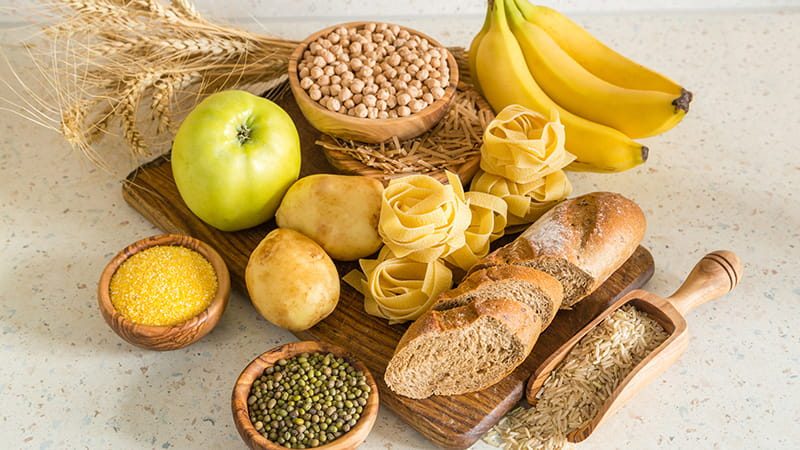Carbohydrates – 1

Nutrition Info
Carbohydrate Overview
Carbohydrates are an important part of a healthy diet. They are found in foods like fruits, vegetables, bread, cereal, and milk. When we eat carbohydrates, our body breaks them down into sugar called glucose, which gives us energy. It's recommended that about half of our daily calorie intake comes from carbohydrates.
There are two types of carbohydrates: complex and simple. Complex carbohydrates are healthier for us because they release energy slowly and keep us feeling full for longer. Examples of complex carbohydrates are whole grains, vegetables, legumes, and potato skins.
On the other hand, simple carbohydrates are not as healthy for us. They are found in foods like white bread, white rice, fizzy drinks, and sugary snacks. These foods quickly raise our blood sugar levels, leading to feelings of anxiety and discomfort. Then, our blood sugar drops quickly, causing fatigue and hunger. Eating too many simple carbohydrates can lead to weight gain and chronic conditions like diabetes.
It's best to choose foods that are less processed, as they are usually more complex and healthier for us. Foods that undergo a lot of processing lose their nutritional value and fibre, which is important for a healthy digestive system.
Remember, it's important to have a balanced diet that includes a variety of foods from different food groups.
Digesting Carbohydrates
When we eat carbohydrates, our body breaks them down into smaller units so that we can use them for energy. The process starts in our mouth with an enzyme in our saliva. Chewing also helps break down the food. In the stomach, carbohydrates continue to break down and become more liquid. In the small intestine, another enzyme helps break them down even further. Some carbohydrates, like lactose in milk, need special enzymes to be broken down. The broken-down carbohydrates enter our blood, where glucose is used by our cells for energy. Some carbohydrates, called fiber, cannot be broken down and provide other benefits like helping our digestion and feeding good bacteria in our gut.
Types of Carbohydrates
Carbohydrates come in different forms:
Monosaccharides are single sugar units like glucose, fructose, and galactose. They give us energy and can be found in fruits and honey.
Disaccharides are two sugar units combined, such as lactose in milk and sucrose in table sugar.
Polysaccharides are long chains of sugar units, like starch in grains and glycogen in animals. They store energy for later use.
Fibre is a type of carbohydrate that doesn't break down. It can be soluble, which absorbs water and helps us feel full, or insoluble, which adds roughage and helps our bowel movements.
Eating Enough Fibre
Many people don't eat enough fibre, which is important for our health. Soluble fibre can be found in foods like legumes, barley, oats, and citrus fruits. Insoluble fibre is in whole grains, vegetables, and fruit and vegetable skins. It's good to eat a variety of fibre-rich foods to get the benefits they offer.
Resistant Starch
Resistant starch is a type of carbohydrate that resists digestion in our small intestine and ferments in our large intestine. It acts as food for good bacteria in our gut and has several benefits, like improving gut health and controlling blood sugar levels. Foods like plantains, green bananas, beans, lentils, and cooked and cooled rice contain resistant starch. Adding resistant starch to our diet can be done by cooking and cooling foods in advance or using specific flours or supplements.
Remember to increase fibre intake gradually and drink plenty of water to avoid digestive discomfort. Enjoy a variety of fibre-containing foods for a healthy diet.
